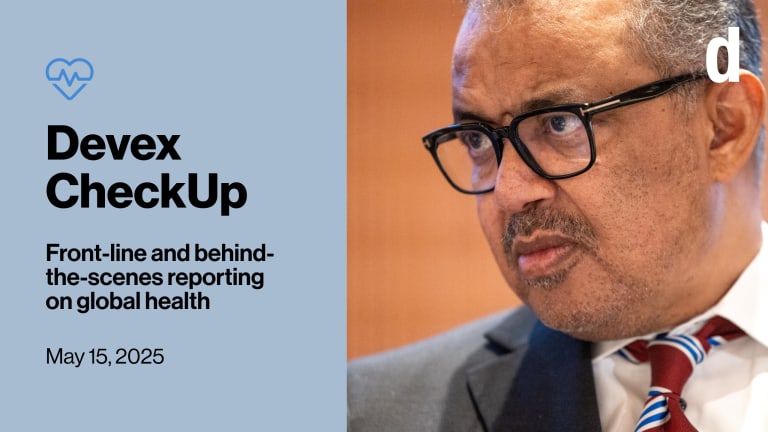
The Ethiopian ambassador to the European Union says that Dr. Tedros Adhanom Ghebreyesus has been “degrading” and “abusing” his position as head of the World Health Organization through his criticisms of the Ethiopian government’s role in the Tigray conflict in northern Ethiopia.
“The way he's handling the matter is completely unprofessional to me,” Hirut Zemene said in an interview in Brussels on Wednesday afternoon. “He is a United Nations figure … The role he is playing right now … is very, very much degrading his position. I would think he would think about global health — like he says ‘global health for all’ — around the world, around Ethiopia, not only in one particular area.”
The New York Times reported last year that Tedros, an ethnic Tigrayan, has lost relatives in the conflict, which began in November 2020 between the federal government and the Tigray People’s Liberation Front, or TPLF. Fighting escalated again on Aug. 24 this year following a lull that had allowed for the limited resumption of humanitarian assistance.
Last year, United Nations Secretary-General António Guterres said that Tigray was living under a “de facto humanitarian blockade,” leaving at least 400,000 people in famine-like conditions. A humanitarian truce was reached in March, but nowhere near the amount of aid needed to meet demand has entered the region since. In June this year, Janez Lenarčič, the Commissioner for Humanitarian Aid and Crisis Management, called for “full and unhindered access into the region, with sufficient supplies of food, medicines, fuel, cash for humanitarian partners”, adding that “basic services need to be restored urgently to allow people to start providing for themselves.”
Tedros has frequently publicly criticized the government and the lack of international attention to the issue. He spoke at length about the humanitarian situation in Tigray at a press conference on Aug. 17, where he detailed the long-standing government blockade of basic services for the region, including telecommunications and banking. “Nowhere in the world you would see this level of cruelty,” he said. “It’s a government [that] punishes 6 million of its people for more than 21 months.”
“Asking for unfettered humanitarian assistance to the people of Tigray, and for the resumption of basic socio-economic services is not putting preconditions for peace talks. These are inalienable human rights.”
— Merkeb Yimesel, a Tigrayan government representative in EuropeZemene once worked under Tedros when the latter was foreign minister of Ethiopia under the previous government, and she helped celebrate Tedros’ election as WHO director-general in May 2017.
On Wednesday, however, she said he has been “abusing his position” at the WHO by commenting “about only one area” in northern Ethiopia — “a very shameful thing to do.”
“Financially, the government has supported him, invested resources in him, to be a representation of the world in the WHO, coming from Ethiopia,” Zemene said. “So the way he's handling the matter is completely unprofessional to me.”
While the conflict spans the northern part of the country to include the Afar and Amhara regions, Tedros has focused his commentary on the government’s blockage of basic services in the Tigray region. Human Rights Watch called the government’s blockade an “abusive siege” that is using “access to necessities” as “a political bargaining chip.”
Reacting to Zemene’s comments, a WHO spokesperson told Devex: “The facts speak for themselves: 6 million people have been living under siege for 21 months with no or limited access to food, health care, banking services, telecommunications and fuel, and other basic needs. For example, if people in Tigray had access to their finances, they would be able to buy medicines and any food that is available. But instead, malnutrition, preventable diseases, and outbreaks have increased, while access to health services has decreased just when they are needed the most.”
The WHO spokesperson said the organization is calling for an end to the siege in Tigray and a peaceful resolution of the conflict, noting that “such calls have been made by the Director-General and WHO in other crises, such as in Syria, Yemen, Ukraine, and Afghanistan.”
It is not the first time the current Ethiopian government, led by Prime Minister Abiy Ahmed, has criticized Tedros. In January this year, it wrote to WHO saying that Tedros had “spread harmful misinformation and compromised WHO’s reputation, independence, and credibility.”
Zemene made the latest comments during an 80-minute interview with Devex this week, where she said she wanted to “clarify some of the myths that you see in the international media” about the conflict. Both sides blame each other for last week’s resumption of hostilities.
Zemene said that while the Ethiopian government was in favor of peace talks, the TPLF was “war drumming and putting preconditions on the situation” such as the need to first restore basic services in Tigray. She said the Ethiopian government’s attempts to restore infrastructure in Tigray had been destroyed and that plans were underway, prior to the most recent outbreak of violence, for World Bank funds to be channeled through international aid organizations in Tigray to assist “in all areas that would need reconstruction.”
In response, Merkeb Yimesel, a Tigrayan government representative in Europe, told Devex by email: “We have not put preconditions per se as the Ambassador would have the world believe. Asking for unfettered humanitarian assistance to the people of Tigray, and for the resumption of basic socio-economic services is not putting preconditions for peace talks. These are inalienable human rights.”
On humanitarian access in Tigray, Zemene said the government had been obliged to take “precautionary measures” to ensure military ammunition was not transported to Tigray, disguised as food aid. She said illegal items, such as electronics and rifles, had been uncovered due to an “unholy alliance” between international aid workers and TPLF.
“These humanitarian convoys could be easily camouflaged to be taking humanitarian assistance, but many other things could pass,” she said. “This is still happening, by the way.”
Asked to provide specific examples, she cited claims last week by the head of the World Food Programme that Tigrayan authorities had stolen 570,000 liters of fuel. The government of Tigray argues that the fuel is rightly theirs under a prior agreement with WFP.
Responding to reports of Ethiopian airstrikes in Tigray in recent days against a kindergarten and hospital, Zemene said that TPLF has militarized civilian infrastructure like schools and churches, and that the Ethiopian military is “very precise” and does not target civilians.
Yimesel responded that allegations of TPLF militarizing humanitarian convoys and civilian infrastructure were “outrageous” and “fabrications.”
Yimesel wrote that the claims were designed to deflect the blame from the government’s own crimes in Tigray as well as “to keep Tigray on a siege on the one hand, and to also indiscriminately bomb civilians and civilian infrastructures by claiming that these are serving as bases for Tigrayan forces.”





